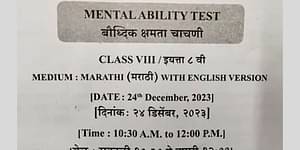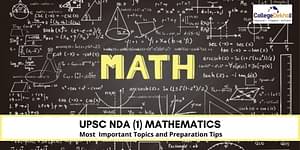M.Ed Syllabus & Subjects 2024
M.Ed Syllabus & Subjects Overview
M.Ed, or Master's in Education, is a postgraduate program focused on theory and research related to teaching methodologies and educational advancements. It encompasses aspects like effective instruction and student counseling, all while staying abreast of the latest educational technologies. Typically, individuals pursue an M. Ed to qualify for roles as primary, elementary, or secondary school teachers, both in government and private educational institutions. Additionally, it opens doors to significant positions within educational organizations and government education departments.
M Ed programs offer various specializations including counseling, women's studies, and special education, allowing students to tailor their education to their interests and career goals. Additionally, M.Ed is available in both regular and distance learning modes, catering to the needs of educators who may face time constraints.
The M. Ed entrance exams are typically computer-based tests comprising multiple-choice questions (MCQs). These exams assess candidates' knowledge in areas such as Statistics, English Language, Reasoning Ability, Educational Psychology, Hindi, and General Awareness.
Table of Contents
M.Ed Year Wise Syllabus
The M. Ed syllabus is meticulously designed to prioritize various pedagogical techniques essential for candidates aspiring to become educators. It offers a balanced blend of theoretical understanding and practical application.
The curriculum of the M.Ed program is highly practical, encouraging candidates to engage in hands-on experiences such as dissertation preparation, internships, academic writing, and active participation in workshops and seminars. These components are integral parts of the M.Ed syllabus, ensuring a comprehensive learning experience.
Listed below are the core subjects taught in the M.Ed curriculum, categorized by semesters for clarity:
M.Ed 1st Year Syllabus
Semester 1 | Semester 2 |
|---|---|
| Foundations of Education | Psychology of Learning and Development |
| Educational Research Methods | Curriculum Design and Development |
| Philosophical and Sociological Perspectives | Assessment and Evaluation in Education |
| Educational Technology and ICT in Education | Elective Course 1 |
| Elective Course 1 | Practicum I (Observation and Reflection) |
| Practicum I (Observation and Reflection) |
M.Ed 2nd Year Syllabus
Semester 3 | Semester 4 |
|---|---|
| Educational Leadership and Management | Special Education and Inclusive Practices |
| Research Project (Part 1) | Research Project (Part 2) |
| Elective Course 2 | Elective Course 3 |
| Elective Course 3 | Elective Course 4 |
| Practicum II (Teaching Practice) | Internship in Educational Institution |
Please note that this is a general outline of a year-wise M. Ed syllabus. The actual syllabus can vary based on the university, location, specialization, and educational trends. Always refer to your institution's official curriculum and syllabus documents for the most accurate and up-to-date information on your M Ed program.
M.Ed Subjects
Here's a table outlining some core and optional subjects typically offered in a Master of Education (M.Ed) program:
Core Subjects | Optional Subjects |
|---|---|
| Foundations of Education | Comparative Education |
| Educational Psychology | Educational Assessment and Measurement |
| Curriculum Design and Development | Educational Policy and Planning |
| Research Methods in Education | Gender and Education |
| Educational Leadership and Management | Adult and Continuing Education |
| Special Education and Inclusive Practices | Guidance and Counseling in Education |
| Educational Technology and ICT in Education | Educational Statistics and Data Analysis |
| Philosophy of Education | Environmental Education |
| Sociology of Education | Language and Literacy Education |
| Assessment and Evaluation in Education | Educational Research and Dissertation Writing |
| Educational Research and Dissertation Writing (Research Project) | Advanced Topics in Education (various specializations) |
| Practicum/ Teaching Practice |
Please note that the availability of specific subjects and their categorization as core or optional may vary from one M. Ed program to another and could depend on the institution's curriculum and the chosen specialization within education. Always refer to your institution's official course catalog or syllabus for the most accurate and up-to-date information on the subjects offered in your M.Ed program.
Specializations offered in M.Ed
Master of Education (M.Ed) programs often offer a range of specializations to allow students to focus on specific areas of education that align with their career goals and interests. Here are some common specializations that are typically offered in M.Ed programs:
Educational Leadership and Administration: This specialization focuses on developing leadership skills and understanding administrative aspects of educational institutions, preparing students for roles such as school principals, administrators, or educational policymakers.
Curriculum and Instruction: This specialization delves into curriculum development, instructional design, and teaching methodologies. Graduates often become curriculum designers, instructional coaches, or teacher educators.
Special Education: Special education specializations prepare educators to work with students with disabilities, including strategies for inclusive education, behavior management, and assistive technology.
Counseling and Guidance: This specialization focuses on counseling techniques, career guidance, and mental health support within educational settings. Graduates may become school counselors or educational psychologists.
Early Childhood Education: Early childhood education specializations focus on teaching and caring for young children, often from birth to around age eight. Graduates may work in preschools, elementary schools, or childcare centers.
Higher Education Administration: This specialization prepares individuals for leadership roles within colleges and universities. Graduates can work as academic advisors, admissions officers, or in student affairs.
Adult and Continuing Education: Adult education programs prepare educators to work with adult learners in various settings, including adult education centers, corporate training, and community colleges.
Language and Literacy Education: This specialization explores language acquisition, literacy development, and strategies for teaching language and literacy skills to students of all ages.
Mathematics Education: Mathematics education specializations focus on teaching math at various levels, from elementary to secondary education. Graduates may work as math teachers, curriculum developers, or education consultants.
Science Education: Science education specializations prepare educators to teach science subjects, emphasizing inquiry-based learning and curriculum development in science.
Technology in Education: This specialization focuses on integrating technology into educational settings, preparing educators to use technology for instruction, assessment, and educational research.
Environmental Education: Environmental education programs explore sustainability, environmental conservation, and outdoor education. Graduates may work in environmental education centers or as environmental educators.
Global and International Education: This specialization examines global education issues and prepares educators for roles in international education organizations, cross-cultural education, or teaching English as a second language.
Please note that the availability of these specializations can vary by institution, and some institutions may offer additional, more specific specializations. When considering an M.Ed program, it's essential to review the specific specializations offered by the institution to ensure they align with your career and educational goals.
Syllabus for Distance M.Ed
Here's a general syllabus for a Distance M.Ed program presented in a tabular format. Please note that the actual syllabus may vary depending on the institution and the specific program.
Semester | Course Title | Course Description |
|---|---|---|
| Semester 1 | Foundations of Education | Introduction to the field of education and its historical development. |
| Educational Psychology | Study of psychological principles and their application in education. | |
| Research Methods in Education | Research methodologies and techniques for educational research. | |
| Curriculum Development | Theory and practice of curriculum design and development. | |
| Elective Course 1 | Choose from a list of specialized education courses. | |
| Semester 2 | Educational Leadership | Leadership theories and their application in educational settings. |
| Assessment and Evaluation | Methods of assessing and evaluating student learning. | |
| Educational Technology | Integration of technology in teaching and learning. | |
| Special Education | Overview of special education policies and practices. | |
| Elective Course 2 | Choose from a list of specialized education courses. | |
| Semester 3 | Education Policy and Governance | Analysis of educational policies and their impact on practice. |
| Comparative Education | Study of education systems in different countries. | |
| Instructional Design | Principles of instructional design and development. | |
| Educational Research Project | Independent research project in an area of interest. | |
| Elective Course 3 | Choose from a list of specialized education courses. | |
| Semester 4 | Educational Ethics and Law | Ethical and legal issues in education. |
| Global Issues in Education | Examination of global educational challenges and solutions. | |
| Dissertation | In-depth research project and dissertation writing. | |
| Elective Course 4 | Choose from a list of specialized education courses. |
Please note that this is a generic syllabus and may not cover all possible courses or variations that can be offered in a Distance M. Ed program. Institutions often customize their programs to suit their specific goals and the needs of their students. Students should refer to their institution's official syllabus for the most accurate and up-to-date information.
M.Ed Entrance Exam Syllabus
Here's a sample syllabus for an M. Ed Entrance Exam presented in a tabular format. Keep in mind that the actual syllabus may vary depending on the institution and the specific program.
Subjects | Topics |
|---|---|
| Educational Philosophy and Foundations | Philosophical foundations of education |
| Sociological foundations of education | |
| Psychological foundations of education | |
| Historical foundations of education | |
| Educational thinkers and their contributions | |
| Educational Psychology | Learning theories and their applications |
| Cognitive development and learning | |
| Motivation and its role in education | |
| Intelligence theories and assessment | |
| Individual differences and learning styles | |
| Curriculum and Instruction | Curriculum development and design |
| Curriculum models and approaches | |
| Instructional strategies and methods | |
| Assessment and evaluation in education | |
| Classroom management and discipline | |
| Educational Research | Research methods and techniques |
| Qualitative and quantitative research | |
| Data analysis and interpretation | |
| Research ethics and validity | |
| Writing research proposals and reports | |
| Educational Leadership and Management | Leadership theories and styles |
| Educational administration and governance | |
| School improvement and change management | |
| Educational policy and law | |
| Teacher professional development | |
| Special Education | Inclusive education principles |
| Special needs identification and assessment | |
| Individualized Education Plans (IEPs) | |
| Differentiated instruction | |
| Assistive technology in education | |
| Educational Technology | Integration of technology in education |
| E-learning platforms and tools | |
| Digital literacy and online resources | |
| Blended learning approaches | |
| Technology-based assessment methods |
Recommended M.Ed Books
Here's a list of recommended M. Ed books that are commonly used in India. These books cover a wide range of topics in the field of education and are suitable for M.Ed students. Please note that this list is not exhaustive, and there may be newer editions available. Always check with your university or institution for their specific recommended readings.
Title | Author(s) | Publisher |
|---|---|---|
| "Philosophical Foundations of Education" | Howard Ozmon | Pearson |
| "Sociological Foundations of Education" | R.S. Peters | Routledge |
| "Psychological Foundations of Education" | Anita Woolfolk | Pearson |
| "Educational Psychology" | Robert E. Slavin | Pearson |
| "Curriculum Development: A Guide to Practice" | Jon W. Wiles and Joseph C. Bondi | Pearson |
| "Curriculum Planning: Integrating Multiculturalism, Constructivism, and Education Reform" | Kenneth T. Henson | Wiley |
| "Assessment in Education" | P. J. Black and Dylan Wiliam | CRC Press |
| "Educational Research: Planning, Conducting, and Evaluating Quantitative and Qualitative Research" | John W. Creswell and J. David Creswell | Pearson |
| "Leadership for Learning: How to Help Teachers Succeed" | Carl D. Glickman | ASCD |
| "Educational Leadership: Concepts, Theory, and Practice" | Frederick C. Lunenburg and Allan C. Ornstein | Cengage Learning |
| "Education Law in India" | N. K. Bajpai | Universal Law Publishing |
| "Inclusive Education: A Practical Guide to Supporting Diversity in the Classroom" | Richard Boon and Alexey D. Sarafin | Routledge |
| "Special Education in Contemporary Society: An Introduction to Exceptionality" | Richard M. Gargiulo and Emily C. Bouck | SAGE Publications |
| "Technology in Education: A Comprehensive Guide" | A.A. Khera | S. Chand Publishing |
| "Blended Learning in Higher Education: Framework, Principles, and Guidelines" | D. Randy Garrison and Norman D. Vaughan | Jossey-Bass |
These books cover a broad spectrum of topics in education, from philosophical foundations to practical aspects of teaching, assessment, and leadership. Be sure to check your M.Ed program's specific reading list and syllabus for any required texts or additional recommended readings.
M.Ed Course Structure
The Master of Education (M. Ed) course structure in India can vary slightly from one university to another, but there are common elements and a general framework that most M Ed programs adhere to. Here's a typical course structure for an M. Ed program in India:
Duration: M Ed programs in India typically have a duration of two years, although there may be variations in some universities.
Credit Requirements: MEd programs usually require students to complete a total of 60 to 64 credits, which are spread across core courses, elective courses, and a dissertation or research project.
Course Components:
Core Courses: These are the foundational courses that all M. Ed students are required to take. They cover essential topics in education. Common core courses include:
Educational Philosophy and Foundations
Educational Psychology
Curriculum Development and Design
Research Methods in Education
Educational Leadership and Management
Educational Assessment and Evaluation
Elective Courses: Students typically have the opportunity to choose elective courses based on their interests and career goals. Elective courses allow for specialization in specific areas of education. Examples of elective courses may include:
Inclusive Education
Educational Technology and E-Learning
Special Education
Comparative Education
Guidance and Counseling
Environmental Education
Practicum: Some MEd programs may include a practicum or internship component, where students gain practical experience in a school or educational institution. This experience is often a requirement for teacher certification.
Dissertation or Research Project: M.Ed programs usually culminate in a dissertation or research project. Students are required to choose a research topic, conduct original research, and write a thesis based on their findings. This component is a significant part of the program and demonstrates the student's ability to contribute to educational research.
Examinations: Throughout the program, students are assessed through a combination of written examinations, assignments, presentations, and viva voce (oral examinations).
Semester System: M.Ed programs in India often follow a semester system, with two semesters in each academic year. There may be an optional summer semester for additional coursework or research.
Optional Seminars and Workshops: Some universities offer optional seminars, workshops, and guest lectures by experts in the field of education to enhance students' knowledge and skills.
Minimum Qualification: Applicants for M. Ed programs in India typically need a Bachelor's degree in Education (B.Ed) or a related field. Admission may also require candidates to pass an entrance examination or meet specific eligibility criteria set by the university.
Note: The exact course structure and curriculum can vary between universities and even within different M Ed programs at the same university. Therefore, it's essential for prospective students to refer to the specific university's official website or admission brochure for detailed and up-to-date information on the M.Ed course structure and requirements.
FAQs about Master of Education Syllabus
What are the best colleges for M.Ed?
Several top colleges in India offer reputable M.Ed programs, including Banaras Hindu University, Jamia Millia Islamia, Tata Institute of Social Sciences (TISS), and Delhi University. Additionally, regional universities like Bangalore University, Punjab University, and Osmania University are known for their strong M.Ed programs. The best choice depends on your specialization and location preferences.
What is the average course fee for an M.Ed program?
The average course fee for an M. Ed program in India typically ranges from Rs. 20,000 to Rs. 1,00,000 or more, depending on the university, location, and whether it's a government or private institution. The fee can vary significantly, with government universities generally offering lower fees compared to private institutions.
Is there any internship for M.Ed courses in India?
Yes, many M Ed programs in India include an internship or practicum component where students gain practical experience in educational settings, such as schools or colleges. This internship provides hands-on teaching or educational leadership experience and is often a requirement for teacher certification or educational leadership roles.
What is the average salary after an M.Ed?
The average salary after completing a Master of Education (M.Ed) in India typically ranges from Rs. 3,00,000 to Rs. 6,00,000 per year, depending on factors such as the educational institution, location, job role, and years of experience. Educational consultants, principals, school administrators, and faculty in higher education often earn at the higher end of this range.
Is Math necessary for M.Ed?
No, math is typically not a mandatory requirement for admission to a Master of Education (M Ed) program in India. M. Ed programs primarily focus on educational theory, practice, and research rather than mathematics. However, specific prerequisites or elective courses may vary by university or program, so it's advisable to check individual program requirements.
What are the entrance examinations required for M.Ed admissions?
Entrance examinations for M.Ed admissions in India often include the Common University Entrance Test (CUET), state-level education entrance tests like MH CET, PTET, etc. and university-specific exams like IPU CET, AMUEEE, etc. These assessments evaluate a candidate's knowledge of education-related topics and may include sections on general knowledge, teaching aptitude, and subject-specific content.
Is M.Ed tough?
M.Ed is not as tough as B.Tech or such other degrees. If you have completed your B.Ed, you will have a sound knowledge of foundational topics and an M Ed course would just help you in diving deep into the specialization of your choice and further enhance your knowledge.
What if I fail in M.Ed?
If you fail in your M. Ed program, you may have options for reappearing in exams or retaking courses, depending on your university's policies. It's essential to communicate with your academic advisor and explore remedial measures, including additional support or study strategies, to improve your performance in subsequent attempts.
Can I get admission to an M.Ed course without an entrance exam?
Yes, it's possible to get admission to an M Ed course without an entrance exam in some universities. Admission criteria can vary by institution. Some universities may admit candidates based on their B.Ed performance, work experience, and academic record, while others may require an entrance exam. Check specific university requirements for accurate information.
Is M.Ed good for the future?
Yes, an M. Ed (Master of Education) is valuable for the future, especially if you're passionate about education. It equips you with advanced knowledge and skills, making you a more effective educator or opening doors to leadership roles in education. With a growing emphasis on quality education, M Ed holders are well-positioned for meaningful careers in the field.
Popular Courses
M.Ed Colleges in States
M.Ed Colleges in Cities
M.Ed Colleges by College Type
- Courses
- Master of Education
- Syllabus


















